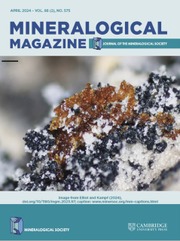Article contents
Crimsonite, PbFe3+2(PO4)2(OH)2, the phosphate analogue of carminite from the Silver Coin mine, Valmy, Nevada, USA
Published online by Cambridge University Press: 02 January 2018
Abstract
Crimsonite (IMA2014-095), PbFe3+2(PO 4)2(OH)2, the phosphate analogue of carminite, is a new mineral from the Silver Coin mine, Valmy, Iron Point district, Humboldt County, Nevada, USA, where it occurs as a low-temperature secondary mineral in association with fluorwavellite, goethite, hematite, hentschelite, plumbogummite and variscite on quartz. Crimsonite occurs in subparallel aggregates of deep red blades or plates flattened on {100} and up to 0.1 mm in maximum dimension. The streak is light purplish orange. Crystals are transparent and have adamantine lustre. The Mohs hardness is ∼3½, the tenacity is brittle, the fracture is irregular to splintery and an imperfect cleavage is likely on {101}. The calculated density is 5.180 g/cm3. Crimsonite is optically biaxial (+), with 2V = 85.5(5)° and γ – α = 0.011. Using the Gladstone-Dale relationship, the calculated indices of refraction are α = 2.021, β = 2.026 and γ = 2.032. The optical orientation is X = b; Y = a; Z = c and the pleochroism is X light orange, Y light yellow, Z red brown; Y < X < Z. Electron microprobe analyses provided PbO 40.69, CaO 0.60, ZnO 0.72, CuO 0.13, Fe2O3 23.36, Al2O3 0.34, V2O5 0.70, As2O5 12.05, P2O5 16.03, SO3 0.33 and H2O 3.64 (structure), total 98.59 wt.%. The empirical formula (based on 10 O apfu) is (Pb1.06Ca0.06)∑1.12(Fe1.71Zn0.05Al0.04Cu0.01)∑1.81(P1.32As0.61V0.05S0.02)∑2.00O8[(OH)1.64(H2O)0.36]∑2.00. Crimsonite is orthorhombic, Cccm, a = 16.2535(13), b = 7.4724(4), c = 12.1533(9) Å, V = 1476.04(17) Å3 and Z = 8. The eight strongest lines in the powder X-ray diffraction pattern are [dobs in Å(I)(hkl)]: 5.86(42)(111); 4.53(45)(112); 3.485(64)(113); 3.190(100) (022); 3.026(40)(004); 2.902(54)(511); 2.502(77)(422) and 2.268(54)(224). The structure of crimsonite (R1 = 3.57% for 740 Fo > 4σF) contains FeO6 octahedra that share edges to form dimers, which are then linked to other dimers by corner sharing to form chains along [010]. These chains are linked by PO4 tetrahedra yielding sheets parallel to {001}. The sheets are linked to one another via bonds to 8-coordinated Pb2+ atoms with non-stereoactive 6s2 lone-electron pairs.
- Type
- Research Article
- Information
- Copyright
- Copyright © The Mineralogical Society of Great Britain and Ireland 2016
References
- 3
- Cited by


